
Urban beekeeping has gained popularity among city dwellers in recent years, as people become more aware of the importance of bees for our ecosystem. However, embarking on this rewarding and sustainable hobby comes with its fair share of challenges. From finding suitable hive locations to ensuring proper nutrition for the bees, city beekeepers need to navigate a unique set of obstacles. In this article, we will explore the challenges of urban beekeeping and provide helpful tips for those looking to join this buzzing community. So, get ready to don your beekeeper suit and embark on a journey to support the bees in your urban jungle!
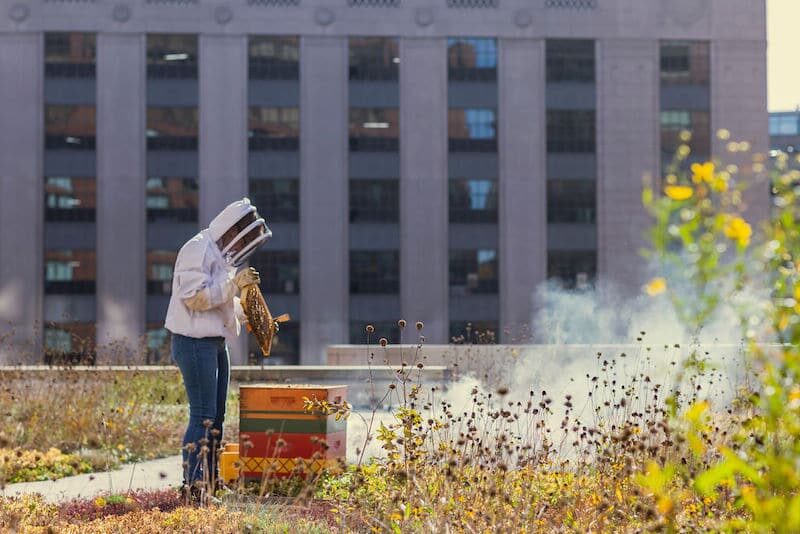
This image is property of bestbees.com.
Choosing the Right Hive Location
Consider Local Regulations and Restrictions
When starting an urban beekeeping venture, it is crucial to familiarize yourself with the local regulations and restrictions in your area. Some cities may have specific rules regarding hive placement, distance from residences, and even the number of hives allowed. Contact your local authorities, such as zoning or agricultural departments, to ensure that you comply with all the necessary regulations. By doing so, you can avoid any legal issues and ensure a smooth and successful urban beekeeping experience.
Find a Suitable Space for the Hive
In urban areas, finding a suitable space for your hive can be a challenge. However, with a little creativity, you can identify a safe and convenient location. Look for areas that receive adequate sunlight and are protected from strong winds. Consider utilizing rooftops, balconies, or small unused spaces in your yard. It’s essential to select a space that is not easily accessible to pets, children, or other potential disturbances. By finding the right spot, you can provide a secure environment for your bees while minimizing any inconvenience to yourself and your neighbors.
Ensure Access to Nectar Sources
One of the key factors to consider when choosing a hive location is access to nectar sources. Bees rely on a constant supply of nectar and pollen for survival and honey production. Evaluate the availability of flowering plants and trees in your area to ensure that your bees have access to a diverse range of nectar sources throughout the year. Urban gardens, parks, and even community garden initiatives can provide ample foraging opportunities for your bees. By ensuring an abundance of nectar sources, you can help support a thriving bee population in your urban environment.
Dealing with Limited Space
Understanding the Space Requirements of Bees
Bees, despite their small size, require adequate space to thrive. Each hive needs enough room for the bees to build their combs and store honey, as well as for the queen to lay eggs. Understanding the space requirements of bees is crucial when dealing with limited space in urban settings. Consider the number of bees you plan to keep and choose a hive size that provides enough room for their needs. While smaller hive options are available, it is essential to ensure that the colony has enough space to develop and expand without becoming overcrowded.
Exploring Hive Types for Small Spaces
Fortunately, various hive types are designed specifically for small spaces. For urban beekeepers, options such as top bar hives, observation hives, or vertical stackable hives can be ideal choices. These hive designs allow for efficient space utilization and ease of management. Top bar hives, for example, are horizontally oriented and provide a compact and accessible hive structure. Observation hives, on the other hand, offer an opportunity to observe bees in action while taking up minimal space. By exploring hive types suited for small spaces, you can make the most of your urban beekeeping setup.
Utilizing Vertical Space
When space is limited, it’s essential to think vertically. Utilizing vertical space can help maximize the available area for your bees. Vertical garden structures, trellises, or even specially designed hive stands can allow you to stack your hives vertically. This approach not only conserves space but also facilitates easier hive management. By stacking your hives vertically, you can create a visually appealing arrangement that ensures your bees have ample space while minimizing the impact on your limited urban area.
Managing Bee Behavior
Minimize Aggressive Behaviors
Bee aggression is a concern for any beekeeper, but it can be particularly challenging in urban settings where close proximity to neighbors is a reality. Minimizing aggressive behaviors in your colony is essential to maintain a harmonious coexistence with your surroundings. A key aspect of addressing aggression is selecting gentle bee breeds known for their calm temperament. Honey bee breeds like Carniolans and Buckfasts are known for their docility and are suitable for urban environments. Regular hive inspections, gentle handling techniques, and minimizing disturbances can also help reduce the chances of aggressive behavior.
Preventing Swarming in Urban Areas
Swarming is a natural process in the life cycle of a bee colony, but it can be disruptive in urban areas. Swarms can create concerns among neighbors and may lead to cluster formation in inconvenient locations. To prevent swarming, ensure that your hive has enough space for expansion, including sufficient honey storage capacity and adequate room for the queen to lay eggs. Conduct regular inspections to assess colony strength and reduce congestion. If swarm cells are detected, use appropriate methods like splitting the hive or controlled swarm prevention techniques to minimize the chances of swarming.
Addressing Defensive Behavior
Defensive behavior in bees is a normal response to protect their hive and themselves. However, in an urban environment, defensive behavior can become a cause for concern. To address defensive behavior, it’s essential to understand its underlying causes. Factors like hive disturbance, poor weather conditions, or nectar scarcity can contribute to heightened defensiveness. Minimize disturbances during hive inspections, ensure proper ventilation and temperature control in your hive, and provide an ample supply of nectar and pollen sources. By addressing the potential triggers, you can help reduce defensive behavior in your urban beekeeping setup.
Ensuring Food and Water Availability
Planting Urban Gardens for Bees
One of the advantages of urban beekeeping is the potential access to a diverse range of flowering plants. Take advantage of this by planting urban gardens specifically designed to support bee foraging. Choose a variety of plants that bloom at different times throughout the year, providing a continuous supply of nectar and pollen for your bees. Native plants, herbs, and flowering trees are excellent options to consider. Bees play a vital role in pollination, and by creating pollinator-friendly urban gardens, you not only support your own honey production but also contribute to the health and diversity of the urban ecosystem.
Providing a Water Source
Bees require water for various purposes, including hydration, temperature regulation, and honey production. In urban areas, access to natural water sources may be limited, making it critical to provide a water source for your bees. Place shallow dishes or birdbaths filled with fresh water near your hive. Adding floating objects like twigs or small stones can help prevent bees from drowning. Regularly refill the water sources to ensure a consistent supply. By providing a readily available water source, you can help keep your bees hydrated and reduce the chances of them seeking water from less desirable places.
Managing Pesticide Exposure
Pesticides can pose a significant threat to bee health and survival. In an urban setting, where pesticide use may be more prevalent, it is essential to manage pesticide exposure to protect your bees. Avoid using pesticides in your own garden and encourage your neighbors to do the same. When planting urban gardens, choose organic and pesticide-free gardening practices. Additionally, be cautious of nearby areas where pesticides may be sprayed, such as parks or golf courses. By managing pesticide exposure, you can safeguard the well-being of your bees and contribute to a healthier urban environment.
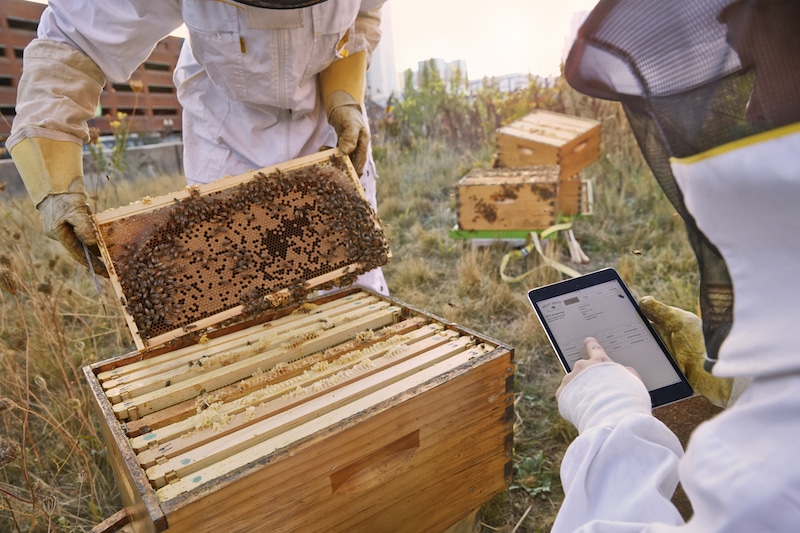
This image is property of bestbees.com.
Considerations for Neighbors and Passersby
Educating Neighbors about Beekeeping
One of the most effective ways to address concerns and build a positive relationship with your neighbors is through education. Take the time to educate your neighbors about the benefits of beekeeping and its importance for the environment. Explain the gentle nature of bees and address any misconceptions or fears they may have. Offer to share the honey produced by your bees as a gesture of goodwill. By educating your neighbors, you can foster understanding and support for your urban beekeeping efforts.
Establishing Bee Flight Paths
Establishing clear bee flight paths can help minimize encounters between bees and passersby. Bees typically fly in a straight line from the hive to foraging areas and back. By directing their flight paths away from frequently used areas, such as entrances, walkways, or play areas, you can reduce the chances of accidental encounters. Consider placing physical barriers like hedges or fencing to guide the bees’ flight path and create a safe zone for human activities. By establishing clear bee flight paths, you can ensure the safety and comfort of both your bees and your neighbors.
Addressing Allergies and Stings
Bee allergies pose a legitimate concern for both beekeepers and those who may come into contact with bees. It is important to communicate openly and honestly with your neighbors about any known allergies and the steps you are taking to manage bees responsibly. Encourage neighbors to consult with their healthcare providers if they have concerns about potential allergic reactions. Additionally, it is crucial to have a plan in place for sting management. Educate yourself on proper sting treatment and consider offering basic first aid training to your neighbors. By addressing allergies and stings proactively, you can ensure a safe and comfortable environment for everyone.
Encouraging Health and Disease Management
Regular Hive Inspections and Monitoring
Regular hive inspections and monitoring are essential for maintaining the health of your bee colony. Implement a consistent inspection schedule to check for potential issues like disease, pests, or hive congestion. Pay close attention to brood patterns, overall colony strength, and honey production. Monitor the presence of mites, beetles, or other parasites that can harm your bees. By conducting regular inspections, you can detect problems early and take appropriate measures to maintain the health and well-being of your bees.
Treatment Options for Varroa Mites
Varroa mites are a common parasite that can severely impact honey bee colonies. Effective treatment of varroa mites is crucial for the long-term survival of your bee colony. Numerous treatment options are available, ranging from organic treatments like essential oils to chemical treatments approved for use in beekeeping. Research and consult with experienced beekeepers or local beekeeping associations to determine the most suitable treatment options for your specific situation. By addressing varroa mite infestations promptly and effectively, you can help ensure the health and productivity of your urban beekeeping venture.
Identifying and Addressing Common Diseases
Bee colonies are susceptible to various diseases, including American foulbrood, chalkbrood, and nosema. It is important to familiarize yourself with the symptoms and signs of common bee diseases, as early detection is key to effective management. Regular hive inspections, coupled with ongoing monitoring, can help identify any signs of disease. Should you suspect a disease outbreak, consult with beekeeping experts or local authorities for proper diagnosis and treatment options. By promptly addressing and containing disease outbreaks, you can protect your colony and prevent the spread of diseases to other beekeepers in your area.
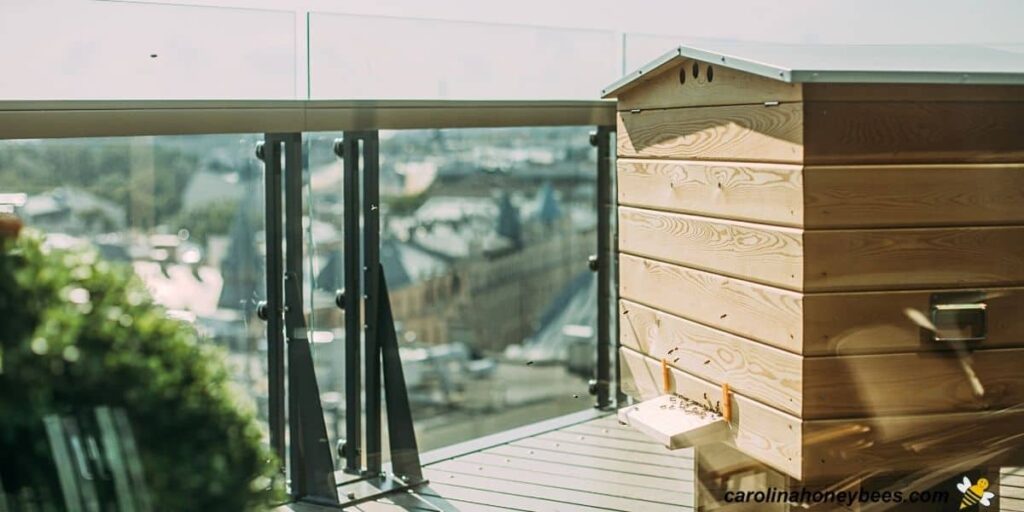
This image is property of carolinahoneybees.com.
Handling Legal and Liability Concerns
Understanding Legal Requirements for Urban Beekeeping
Urban beekeepers must familiarize themselves with the legal requirements specific to their location. Each city and municipality may have different regulations regarding beekeeping, and it is essential to understand and comply with these laws. Research local ordinances, permits, and any zoning restrictions that may apply to beekeeping activities. Local authorities, such as zoning departments or agricultural agencies, can provide guidance and information on the legal requirements for urban beekeeping in your area.
Obtaining Necessary Permits and Permissions
Once you understand the legal requirements, ensure that you obtain any necessary permits and permissions before starting your urban beekeeping operation. Applying for permits can involve submitting documentation, attending hearings, or paying fees. Prepare all the required documents and follow the necessary procedures to obtain the relevant permits. This will not only ensure compliance with the law but also demonstrate your commitment to being a responsible urban beekeeper.
Addressing Liability and Insurance
Beekeeping, despite its many benefits, does carry some risks. It is important to address liability concerns and consider appropriate insurance coverage. Consult with an insurance professional to understand your options for liability insurance that specifically covers beekeeping activities. Also, explore the possibility of homeowner’s insurance or other coverage to protect yourself against potential accidents or incidents related to beekeeping. By addressing liability and securing appropriate insurance coverage, you can have peace of mind and minimize the financial risks associated with urban beekeeping.
Educational Opportunities for Beekeepers
Joining Local Beekeeping Associations
Joining a local beekeeping association is an excellent way to gain support, access resources, and foster connections with experienced beekeepers in your area. These associations often provide workshops, mentorship opportunities, and educational events that can enhance your beekeeping knowledge and skills. Networking with like-minded individuals can also provide valuable insights and practical advice for successful urban beekeeping. Research and reach out to beekeeping associations in your city or region to inquire about membership benefits and upcoming educational opportunities.
Attending Workshops and Classes
Attending workshops and classes focused on beekeeping is a valuable educational opportunity for both novice and experienced beekeepers. Look for classes specifically tailored to urban beekeeping, as they may address the unique challenges faced in urban environments. Workshops often cover topics such as hive management, disease prevention, honey extraction, and more. Check with local beekeeping associations, agricultural extension offices, or community centers to discover upcoming workshops or classes in your area. By investing in your education, you can continuously improve your beekeeping skills and ensure the success of your urban beekeeping endeavor.
Participating in Citizen Science Projects
Engaging in citizen science projects can be a rewarding way to contribute to ongoing research and conservation efforts while expanding your knowledge as a beekeeper. Citizen science initiatives often focus on collecting data on bee populations, habitat quality, or the impact of environmental factors on bee health. Participating in these projects allows you to actively contribute to scientific knowledge while gaining a deeper understanding of bees and their role in the ecosystem. Explore opportunities available through universities, research organizations, or even online platforms to find citizen science projects suitable for urban beekeepers.
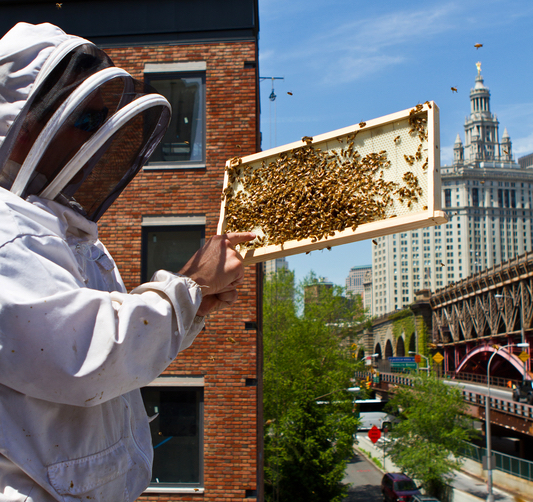
This image is property of wildflowermeadows.com.
Resources for Urban Beekeepers
Accessing Local Beekeeping Support Groups
Local beekeeping support groups offer a valuable resource for urban beekeepers. These groups often organize regular meetings, workshops, or field trips, providing opportunities to connect with fellow beekeepers and share experiences. Joining these support groups can help you stay updated on the latest techniques, local challenges, and emerging trends in urban beekeeping. Seek out local beekeeping support groups through online directories, social media platforms, or by reaching out to your local beekeeping association. By connecting with other urban beekeepers, you can tap into a wealth of knowledge and support.
Utilizing Online Resources and Forums
Online resources and forums provide a wealth of information and guidance for urban beekeepers. Websites, blogs, and forums dedicated to beekeeping offer a vast array of articles, tutorials, and discussions focused on urban beekeeping challenges and solutions. Utilize these resources to learn from experienced beekeepers, access troubleshooting guides, and stay informed about the latest advances in beekeeping practices. Be mindful of sourcing information from reputable sources and consult various perspectives to ensure a well-rounded understanding of the topics you explore.
Connecting with Experienced Urban Beekeepers
Connecting with experienced urban beekeepers can be one of the most valuable resources for your beekeeping journey. Experienced beekeepers offer firsthand knowledge, practical tips, and insights gained from their own experiences. Reach out to experienced urban beekeepers, either within your local community or through virtual platforms, to seek guidance, ask questions, and build relationships. Mentoring relationships with experienced beekeepers can provide ongoing support as you navigate the unique challenges of urban beekeeping. By connecting with these knowledgeable individuals, you can access personalized advice and gain confidence in your own beekeeping practices.
Conclusion
Urban beekeeping presents both challenges and opportunities for city dwellers. By carefully choosing the hive location, addressing limited space concerns, managing bee behavior, ensuring food and water availability, considering neighbors and passersby, promoting health and disease management, handling legal and liability concerns, embracing educational opportunities, and utilizing available resources, you can successfully embark on an urban beekeeping adventure. With proper planning, education, and community involvement, you can contribute to the health and well-being of bees, enhance your local environment, and experience the joys of being an urban beekeeper.
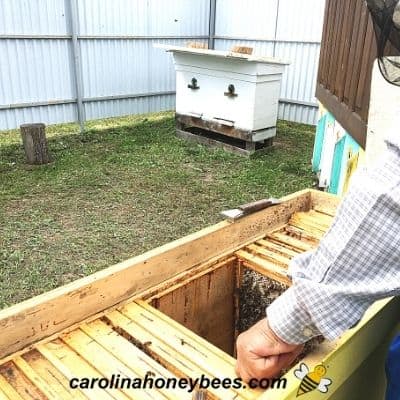
This image is property of carolinahoneybees.com.